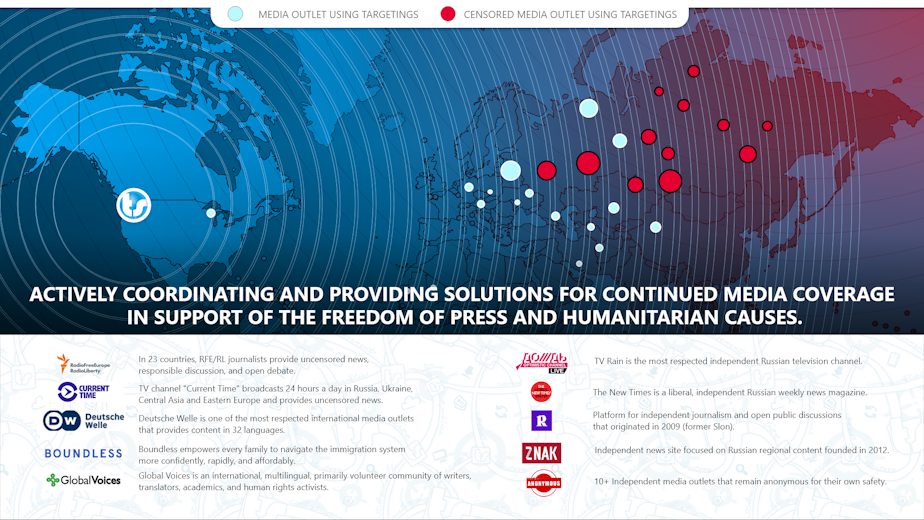Redmond tech company is part of the battle against Russia's censorship

As Russia invaded Ukraine in February, it also spurred a battle for information, waged with censorship and state-controlled media.
A journalist could face prison time if they go against the state's official narrative, like calling it a "war" instead of a "special operation."
But the battle for information has no borders. Independent news outlets across the globe are finding ways to get around Russia’s censorship. And a Redmond-based tech company has found itself involved in a corner of that fight.
"We are playing a vital role in helping get information from outside of Russia, with objective reporting, to those audiences that have an appetite for it,” said Chris Deco, Targetings’ general manager for North America.
Targetings didn’t develop its content distribution platform with the sole intention of dodging censorship. It just wanted to use AI to distribute content across social media, messaging apps, etc. It just happens to work well with independent news outlets that want to get around Russia’s crackdown on information.
This story gets a little tech heavy, so here are a few things to understand.
- Targetings provides content distribution services. If you're a media company publishing news on a website, you can use Targetings to send news to Facebook, Twitter, Telegram, and other online hubs. It uses AI, so it’s a bit fancier than just posting links online.
- Russia’s Roskomnadzor (the branch of the government that monitors and censors media) is blocking websites that don’t adhere to its official narrative. This means people using computers inside Russia cannot access news and information that is blocked by the government.
- A tactic that independent media outlets have started using is “mirror websites.” These are websites with different addresses, but they all have the same news. So if the government blocks one site, another pops up and the coverage continues.
Sponsored
But what if you are a news website that keeps having to change your web address between mirror sites in order to dodge Russia's blocks? Targetings tech helps by making sure news coverage continues to be distributed across social media, etc., despite frequent website switch-ups and other disruptions.
“With the crackdown on independent media, outlets have resorted to tactics in order to almost create a game of whack-a-mole to remain anonymous and to continue publishing,” Deco said, adding that Targetings had already been working with independent media outlets within Russia and Eastern Europe since 2014.
“Within Russia, they’ve banned Facebook, they’ve banned Twitter,” he said. “The audiences, they are seeking other means, other networks, Telegram being one of them. There are regional messengers and networks they are turning to to get information. And we don’t see that stopping.”
Targetings therefore has to stay on top of trends and get information to wherever people are tuned in.
News Russians can use
Alla Gavrilov reports for an independent media outlet, NEWSru.co.il, a Russian-language news website based in Israel. It reports on Russia, in Russian, from beyond the Roskomnadzor’s censorship. It has been able to continue its coverage, editorials, interviews with locals from within the war zone, and stories about people who have fled the war. More than half of its audience is in Israel.
“The rest is mainly from Ukraine, Russia, and the USA,” Gavrilov said. “In Russia, NEWSru.co.il was blocked by the authorities because of publications concerning the war in Ukraine, but readers in Russia know how to use VPN and still have access to our publications through social media.”
A VPN (virtual private network) is a tool people can use to make their computer appear as if it is located somewhere it is not. So someone in Russia could use a VPN to make it appear as if they are outside Russia, and therefore could access websites that are blocked inside their country.
Gavrilov said that almost all Russian and foreign independent media that refuse to abide by Russia’s guidelines are blocked inside the country. For example, Russia wants Gavrilov’s website to refer to the invasion of Ukraine as a “special operation,” and not a “war.” It also requires media to not publish any information unless it comes from state sources.
“Obviously, NEWSru.co.il is not going to obey,” Gavrilov said.
Sponsored
Under this censorship, Gavrilov observed a Russian crack down on Ukrainian websites shortly after the invasion began, then prominent Russian sites. Then it came for foreign media. On March 27, she says her website received a letter from Roskomnadzor demanding it remove certain articles and information.
“On the same day NEWSru.co.il was blocked by a number of Russian internet providers,” Gavrilov said. “On March 28 we were blocked in Russia completely. But we still receive the ‘letters of warning’ from Roskomnadzor. It has not influenced our work. The traffic decreased a little bit, but it has not affected our editorial policies.”
It has also not affected its ability to distribute information. Despite any dodging and weaving tactics to get around Russia’s censorship, Targetings has helped NEWSru.co.il continue to distribute information across social media and other online avenues.
So, while Russian forces wage war in Ukraine, a news outlet in Israel is able to use a Redmond tech company to distribute information back into Russia.
Aside from NEWSru.co.il, Deco says that Targetings is working with a range of “independent media sources and outlets within Russia to help them continue distributing their objective coverage of the conflict to their audiences around the current ban.”

He also notes that many of their media customers have fled Russia and continue to work from outside the country.
“It’s as scary as you can imagine… it’s a horror story,” Deco said. “They’re facing 15-20-year prison sentences… that’s come down from the Russian regime. There are significant consequences if caught putting out any information and reporting on this war that is outside of state-controlled messaging and headlines.”




